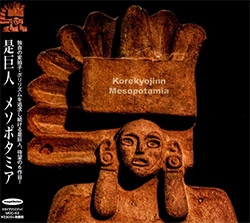
Korekyojinn, over the course of their discography, have injected some much-needed adrenaline into prog-rock. And, in their most recent album, Mesopotamia, Korekyojinn continue this process of galvanization; they remind us that the days of turgid, stagnant prog-rock are a relic of the distant past.
Jubilant polyrhythms commence the first and titular track of Mesopotamia. These energetic tempos, though, do not run amuck; for, they are ushered and ordered around by vociferous percussive hits. Over the course of this opening track, melody and rhythm oscillate in and out of phase, eventually intertwining. However, this initial sense of harmony is fleeting; a frenzied guitar eventually begins to snarl its demands of dominion. The tone of what will follow has already been set.
The next track, “Lucky Dip,” consists of a recurring sonic motif that evolves into various distinct sonic species. The noteworthy aspect of this song is that its layers of arpeggiated sequences mesh such that a lucid sensation of ebb and flow is realized. “Lucky Dip is an anthem of sheer vitality: extending and retracting, inhaling and exhaling.
Unlike the songs that preceded it, the sounds of “Karakorum” are somewhat more familiar. Just in case the listener has acclimated to the vertiginous scales of Mesopotamia, perhaps “Karakorum” reminds the listener that base camp is far from here. The (sonic) summit of Mesopotamia is still yet to pierce through the clouds that shroud it.
The next few tracks act as the gruelling ascent to this (sonic) summit. In “Junction,” thick, strummed chords underscore staccato spurts. These distinct modes of sound wrestle with their opposite, creating an alluring sonic spectacle. In fact, this spectacle is so captivating that even the track itself stalls and sputters to take a series of quick, inquisitive glances at itself. The denouement of “Junction” is signified by an onslaught of efflorescent movements. “Oval Moon,” the next song, starts with deft and delicate acoustic sequences. Once again, successions of arpeggios tentatively precipitate into the mix (at this moment, such arpeggios have become symptomatic of Mesopotamia). Replicating what has been heard before, adroit rhythms provide the basis for these arpeggios to reify and flourish.
The concluding track, “Nine Tails,” serves as the full actualization of the themes that the listener has heard up to this point. Redolent of “Oval Moon,” “Nine Tails” commences with stripped back, plucked instrumentation. Again, those symptomatic arpeggios are present; however, they are juxtaposed with wispy, ambient swells. The result of this curious contrast is sheer awe. It is here that the listener is no different from the intrepid climber; a sense of awe clasps them both as they reach the (sonic) summit.
The satirical characterization of prog-rock is that it is a genre consisting of overly formalized, rigid, and bloated songs. Thankfully, Mesopotamia shows that this characterization is precisely that — satirical. So, listen; realize that the legs of this genre have not gone lame just yet.
Comments and Feedback:



More Recent Reviews, Articles, and Interviews @ The Squid's Ear...


|

